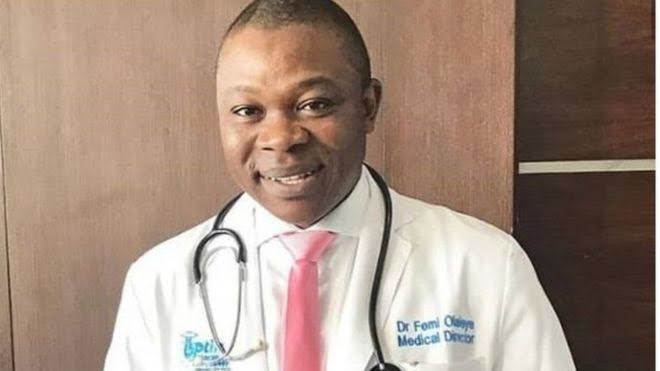Lagos has challenged the judgment freeing Femi Olaleye and heads to the Supreme Court.
Glamtush reports that the Lagos State Government has approached the Supreme Court in its bid to overturn the judgment of the Court of Appeal which quashed the conviction of Femi Olaleye, the Managing Director of Optimal Cancer Care Foundation, on a two-count charge of defilement of a child and sexual assault by penetration.
Channels TV’s judiciary editor, Shola Soyele obtained the notice of appeal, which was filed on Dec. 27, 2024.
The notice, which was filed by the Lagos State Director of Public Prosecutions, (DPP), Dr. Babajide Martins, another Director in the Ministry of Justice, Mr Adebayo Haroun, and Deputy Director, Mr. Babajide Boye alongside 3 other counsel, contained 3 Grounds of Appeal.
The grounds challenged the whole decision of the court of appeal, particularly the requirement that the evidence of the alleged survivor of the crime (names withheld) required corroboration, the failure of the trial court to conduct the trial within a trial on the confessional statements of the defendant and the failure of the prosecution to call the DPO to testify in the matter.
The Lagos State Government therefore asked the Supreme Court to make an order allowing the appeal and setting aside the judgment of the Court of Appeal delivered on the 29th of November, 2024, AND an ORDER affirming the conviction and sentence of Dr. Olaleye by the Trial Court.
In ground one of the notice of appeal, the complainant specifically said that the learned Justices of the Court of Appeal erred in law when they held in total disregard of Section 209 (2) of the Evidence Act, 2011 and the decision of the Apex Court in DAGAYA V. STATE when it held that sworn evidence of a child above 14 years requires corroboration.
The appellant noted that in the instant case, the prosecution witness 2, the victim in this suit was not a child, and the appellate court was wrong to have held that her sworn evidence still requires corroboration in total disregard to the provisions of Section 209 (2) of the Evidence Act, 2011.
In ground two, the appellant held that the Justices of the Court of Appeal erred in Law when they held that the confessional statements of the defendant, Exhibits H, HI &H2 were wrongly admitted and relied upon by the trial court having failed to conduct the trial within trial for their admissibility.
The Lagos government noted that the factors guiding the admissibility of confessional statements are well laid down in Sections 28 and 29 of the Evidence Act, 201 and an objection to such admissibility must be raised at the time the statement is sought to be tendered, not after it has been admitted without objection.
“Where an objection to the admissibility of a document on ground of voluntariness of the statement has been withdrawn by the Defendant there is no requirement to conduct trial within a trial hence Exhibits H, H1 & H2 were properly admitted
“After the close of the Prosecution’s case, a defendant called as a witness may be cross-examined on his earlier statement with a view to contradict him by the writing or discredit him as in the instant appeal and this is permitted under Section 232 of the Evidence Act, 2011 and such statement does not require trial within trial”
In ground three, the complainants stated that the Justices of the Court of Appeal erred in Law when they held that failure of the Prosecution to call DPO Patricia Amadi and Aunty Tessy was fatal to the case of the Prosecution in the trial Court.
According to the Lagos State Government, the law is settled that the Prosecution is not obliged to call all the witnesses listed in the information nor is a host of witnesses required to prove the allegations beyond reasonable doubt. A single witness who gives cogent eye witness account on a vital point will suffice.
“The absence of Aunty Tessy was not in any way fatal ot the case of Prosecution where evidence of PW2 and that of other witnesses have already established the ingredients of the offence against the Defendant/ Respondent “
“The absence of DPO Patricia Amadi who was not the Investigating Police officer, was not in any way fatal to the case of the Prosecution more so when PW6 who investigated the case gave evidence of investigation and this was not discredited”.
Background
In November 2022, the Lagos State Government had arraigned Dr Olufemi Olaleye before the State’s Domestic and Sexual Violence Court sitting in Ikeja, on a two-count charge of defilement of a child and sexual assault by penetration.
At his arraignment, the doctor pleaded not guilty to the charge preferred against him.
In October 2023, trial judge, Justice Rahman Oshodi convicted and sentenced him to life imprisonment.
Having evaluated all the evidence before him, Justice Oshodi noted that it was “compelling”.
According to the judge, Olaleye’s confessional statement before his former counsel, Mr Olalekan Buruji, and the Divisional Police Officer at the Anthony Police Station, Lagos State, proved that he committed the offences.
The judge held that Olaleye said in the statement that he regretted his act.
The judge also held that Olaleye’s denial of the statement during trial did not hold water.
Justice Oshodi described the medical director as a dangerous offender who did not show any sign of remorse during trial.
In the words of the judge, “You acknowledged that you are a sex addict in your confession, but came to this court and told lies.
“You showed no remorse, and it shows that you are a dangerous man.
“The survivor, to your knowledge, is a child but you forced her to watch pornography, rub her breasts and put your penis in her mouth.
“You penetrated her repeatedly,’’ Oshodi said.
The court found the defendant guilty of the offence.
In sentencing, Justice Oshodi said, “By the laws of Lagos State, I am compelled to hand you a sentence of life imprisonment on each count of your offence, but your counsel has said that you are a first-time offender and a doctor of cancer patients.
“I hereby sentence you to life imprisonment on both counts one and two.”
The judge also directed that Olaleye should have his name written in the Sexual Offences Register of the Lagos State Government.
During the trial, the convict’s wife, Aderemi Olaleye, had told the court in her testimony that her husband had been sexually abusing her niece during her stay in their house.
Mrs Olaleye said she got to know about the alleged crimes after the survivor confessed to her aunt and the family’s driver that the doctor had been sleeping with her and threatening to kill her if she tells anyone.
The mother of two, who was the complainant said on oath, “My lord, on November 27, 2021, my second cousin told my aunty who is my mother’s sister that since March 2020, Femi has been sexually abusing her and introduced her to pornography, from there he graduated to oral sex with her, that he does this in different places in the house where there are no cameras.”
The offences were said to have contravened the provision of Sections 137 and 261 of the Criminal Law of Lagos State, 2015.
Dissatisfied with the verdict, Dr Olaleye headed to the Court of Appeal and in November 2024, the Lagos Division of the Court discharged and acquitted him, citing errors in the lower court’s judgment.
Justice Olukayode Bada who read the lead judgment which was adopted by the two other justices on the panel held that the trial court erred in convicting Dr Olaleye based on “tainted” and ‘unreliable’ evidence of his estranged wife, Oluremi and the alleged survivor (names withheld).
The appellate court said there were material contradictions in the evidence gathered by the prosecution which should not have been relied on by the lower court
The court also faulted some other part of the evidence of the prosecution during trial, which were from a child forensic specialist, a medical doctor from the Mirabel centre and the investigating officer, which were found to be “worthless”
For the appellate court, the trial judge, Justice Rahman Oshodi also descended in the arena and interfered in the proceedings to bridge what it described as “the yawning gaps in the prosecution’s case”.
In the judgment, the court of appeal also queried why the prosecution failed to present material witnesses such as two family members who were said to have witnessed the appellants alleged confession.
The court added that a trial within trial ought to have been conducted during trial to verify the voluntariness of the appellant’s confessional statements while in police custody, especially as he said he made it under duress after he had been detained for six days.
The court of appeal determined all five issues of appeal against the prosecution and in favour of the appellant, Dr Olaleye.
Channels TV























